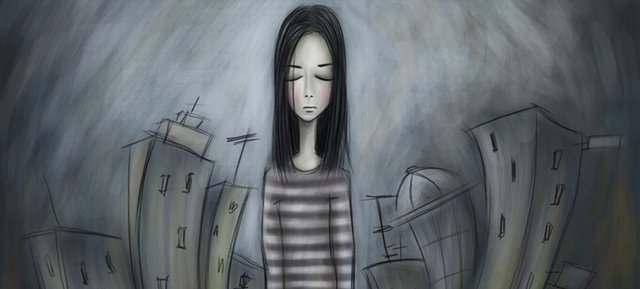Depression is a state of low mood and aversion to activity or apathy that can affect a person's thoughts, behavior, feelings and sense of well-being.[1][2]
People with a depressed mood can feel sad, anxious, empty, hopeless, helpless, worthless, guilty, irritable, angry,[3] ashamed or restless. They may lose interest in activities that were once pleasurable, experience loss of appetite or overeating, have problems concentrating, remembering details or making decisions, experience relationship difficulties and may contemplate, attempt or commit suicide. Insomnia, excessive sleeping, fatigue, aches, pains, digestive problems or reduced energy may also be present.[4]
Depressed mood is a feature of some psychiatric syndromes such as major depressive disorder,[2] but it may also be a normal reaction, as long as it does not persist long term, to life events such as bereavement, a symptom of some bodily ailments or a side effect of some drugs and medical treatments. A DSM diagnosis distinguishes an episode (or 'state') of depression from the habitual (or 'trait') depressive symptoms someone can experience as part of their personality.
(http://depressionandanxieties.com)
Treatment
Main article: Management of depression
Depressed mood may not require professional treatment, and may be a normal reaction to life events, a symptom of some medical condition, or a side effect of some drugs or medical treatments. A prolonged depressed mood, especially in combination with other symptoms, may lead to a diagnosis of a psychiatric or medical condition which may benefit from treatment.[34] Different sub-divisions of depression have different treatment approaches.[35] In the United States, it has been estimated that two thirds of people with depression do not actively seek treatment.[36] The World Health Organisation (WHO) has predicted that by 2030, depression will account for the highest level of disability accorded any physical or mental disorder in the world (WHO, 2008).[37]
The UK National Institute for Health and Care Excellence (NICE) 2009 guidelines indicate that antidepressants should not be routinely used for the initial treatment of mild depression, because the risk-benefit ratio is poor.[38] A recent meta-analysis also indicated that most antidepressants, besides fluoxetine, do not seem to offer a clear advantage for children and adolescents in the acute treatment of major depressive disorder.
Sex differences
Main article: Sex differences in depression
Women have a higher rate of major depression than men. While women have a greater proportion of somatic symptoms, such as appetite, sleep disturbances and fatigue accompanied by pain and anxiety, than men, the gender difference is much smaller in other aspects of depression.[41] Instances of suicide in men is much greater than in women. In a report by Lund University in Sweden and Stanford University, it was shown that men commit suicide at a rate almost three times that of women in Sweden, and the Centers for Disease Control and Prevention and National Center for Injury Prevention and Control report that the rate in the US is almost four times as many males as females.[42] However, women have higher rates of suicide ideation and attempts.[citation needed] The difference is attributed to men choosing more effective methods resulting in the higher rate of success.[43][44] This research would suggest that women are more likely to discuss their depression, whereas men are more likely to try and hide it. The culture of women being more free to express than men, could be a contributing factor to this phenomenon

Hi! I am a content-detection robot. I found similar content that readers might be interested in:
https://en.wikipedia.org/wiki/Depression_(mood)
Downvoting a post can decrease pending rewards and make it less visible. Common reasons:
Submit